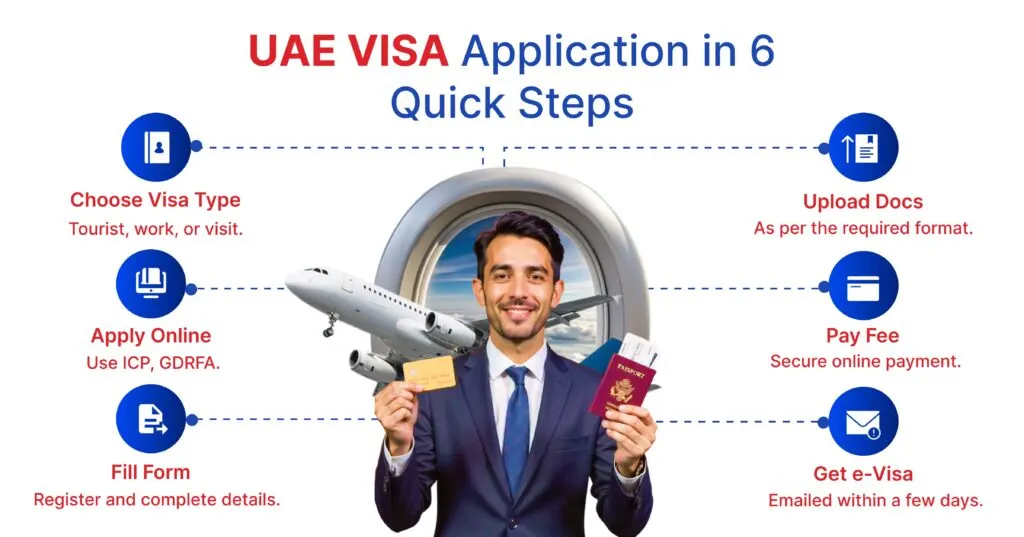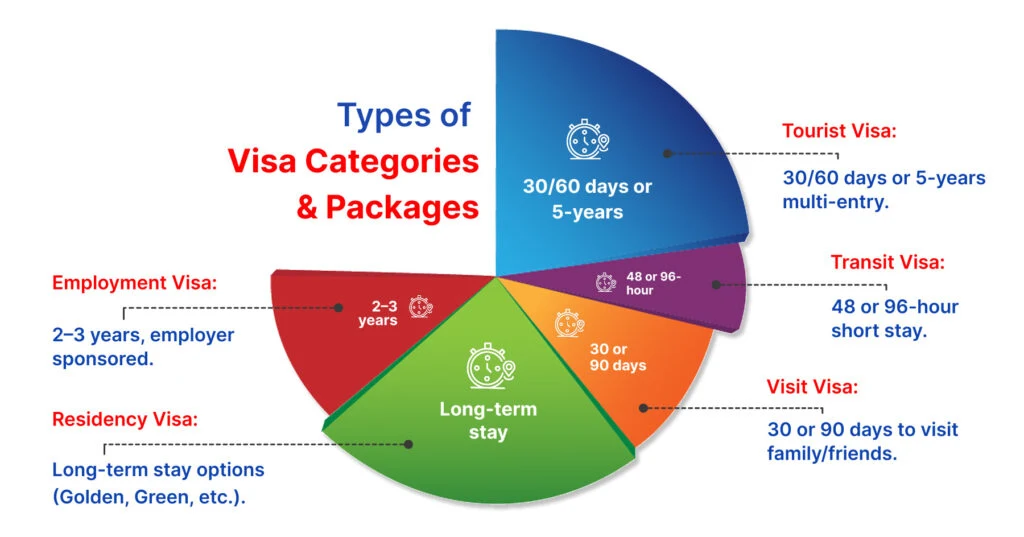A valid passport is universally required for travel. It must have at least six months of validity from the expected arrival date in the UAE. At least one blank page is needed for entry stamping. Passport-sized photos must meet specific requirements, typically featuring a white background and 80% face visibility. Applicants must also have no prior deportation or ban from the UAE.
Specific Criteria for Each VISA Type:
Each UAE visa type comes with its own set of eligibility requirements and documentation standards:
-
Criteria for Tourist/Visit Visa
Applicants generally need a confirmed onward or return ticket. Proof of accommodation, such as a hotel booking or an invitation letter from a UAE resident, is necessary. Financial proof, often in the form of bank statements, demonstrates the ability to cover expenses. Travel insurance may also be required.
Applicants must typically be between 18 and 60 years old. They need relevant academic qualifications, such as a degree or diploma. A signed Employment VISA contract is mandatory. Obtaining medical screening clearance and valid health insurance are also key requirements.
-
Criteria’s for Residency Visas
Residency visas in the UAE come with specific eligibility criteria, including minimum income thresholds or significant investments. Below are the key categories:
-
- Golden Visa: Requires a minimum investment of AED 2 million for certain sectors.
- Virtual Work Visa: Proof of remote employment is necessary for eligibility.
- Blue Visa: Requires documented environmental contributions for qualification.
- Investor Visa: Available for individuals investing in businesses or properties in the UAE.
- Criteria for Family Visa: Allows UAE residents to sponsor their family members.
Key Things to Know Before & After Applying for Your UAE Visa
Careful preparation before applying and diligent monitoring after submission are crucial for a smooth VISA process.
Before Applying
Prepare thoroughly to avoid delays and ensure smooth visa approval:
-
Verify Passport Validity:
A passport must be valid for at least six months from the expected arrival date. Insufficient validity is a common reason for VISA rejections. Ensure at least one blank page is available for stamping.
-
Gather All Necessary Documents:
Prepare all paperwork in advance, ensuring documents are accurate and up-to-date. Clear digital copies must meet format requirements. UAE immigration requires documents to be attested and professionally translated into Arabic, a process that can take up to two months.
-
Understand VISA Conditions and Extensions:
Know the visa’s maximum length of stay and allowable entry counts (single or multiple). Overstaying leads to fines and penalties. Many visas now allow in-country extensions, so apply for extensions before the current VISA expires.
After Applying
Stay informed and track your application to avoid surprises and penalties:
-
How to Track Your Application Status:
Use official government portals like the Federal Authority for Identity, Citizenship, Customs & Port Security (ICP) for most Emirates, or the General Directorate of Residency and Foreigners Affairs (GDRFA) for Dubai.
You can check your VISA status online for free using your passport number or application/file number, or by contacting official Amer or ICP support lines.
-
Grace Periods and Overstay Consequences:
There is no grace period in the UAE. For tourist and visit visas, the 10-day grace period has been removed. Overstaying now incurs an immediate fine of AED 50 per day for these VISA types. Residency visas have different, tiered fines, starting at AED 25 per day for the first six months.
However, Blue VISA holders receive a 180-day grace period. Overstaying can lead to deportation and future travel bans. This differentiation in grace periods highlights the increased urgency for short-term VISA holders to manage their stay carefully.



